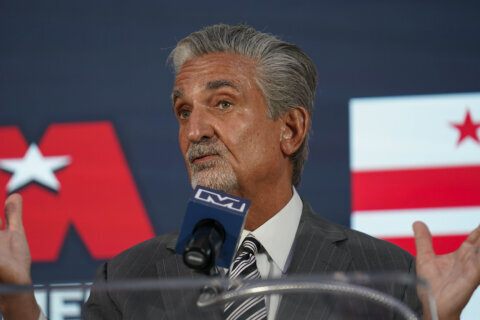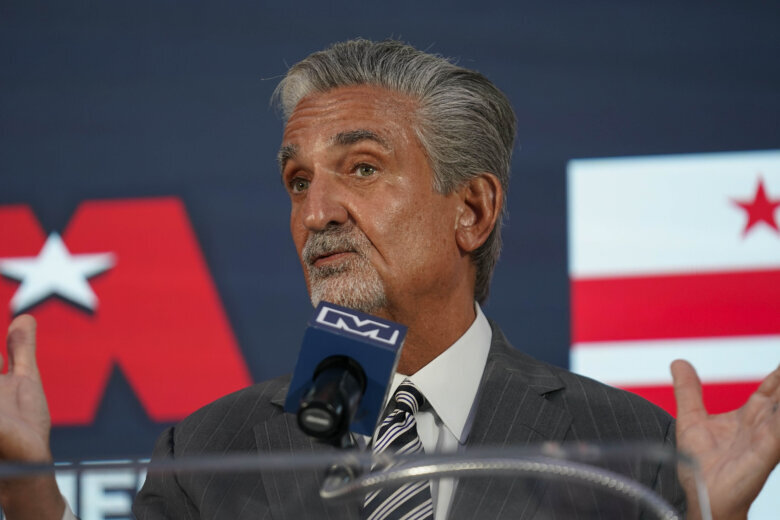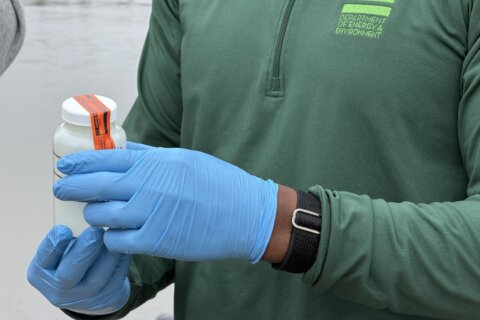Putting the blame on politics, Capitals and Wizards owner Ted Leonsis said he had become political “collateral damage” as Virginia lawmakers considered his plan to move the teams out of D.C. and build a new arena for them in Alexandria.

“I’m glad I’m not a politician,” Leonsis said Friday in an interview with WTOP. “I think politics took over, which I felt very uncomfortable about.”
- ‘This deal is a win-win-win’: Mayor Bowser praises new deal to keep Caps, Wizards in downtown DC
- Youngkin ‘boggled’ Caps, Wizards deal ‘from the beginning,’ Va. Sen. Lucas tells WTOP
- Q&A: Virginia Gov. Glen Youngkin says he’s ‘working on’ resurrecting Wizards, Capitals arena plan in budget
Leonsis seemed confident in the arena plan late last year when he and Virginia Gov. Glenn Youngkin stood together and announced it.
Looking back on that, would Leonsis do anything differently?
“It’s not the way I operate, having regrets and things like that,” said Leonsis, who’s CEO of Monumental Sports & Entertainment, which owns the Washington Capitals and Washington Wizards. “I’m only looking forward.”
When asked whether he thought the governor had underestimated how difficult it would be to get the deal done, Leonsis said “I don’t know, and I don’t want to speculate.”
The plan called for the creation of a $2 billion development district in the Potomac Yard section of Alexandria.
Virginia’s General Assembly was asked to set up an authority that would issue bonds to finance most of the project, backed partly by the city and state governments and repaid through a mix of projected tax revenues recaptured from the development.
Youngkin and other supporters said the development would generate tens of thousands of jobs, along with new tax revenues beyond what would have been needed to cover the financing.
Ultimately, however, there proved to be too much political opposition.
“I had always looked at Virginia as being a well-managed state, wanting to do business,” Leonsis said, adding that this experience changed his opinion.
“It was like, ‘oh my gosh, this has nothing to do with business anymore; this has to do with politics,'” Leonsis said. “Who would have thought that D.C. was easier to work with than Virginia?”
When asked whether Leonsis or anyone on his team lobbied Virginia lawmakers directly, he responded by saying, “No, we’re not politicians.”
Ongoing contact with Bowser
Even though Leonsis had been public about his desire to move the Capitals and Wizards out of D.C., dialogue between him and Mayor Muriel Bowser never soured or stopped throughout the process, he said.
Leonsis said they even ran into each other by chance at a conference in mid-January.
“I was like, ‘Oh, hey, how’s it going?'” Leonsis said. “We both hugged each other, and she sent me a text the next day and said ‘It was great to see you, let’s keep the lines of communications open.'”
“I said ‘awesome,’ and it took off from there,” Leonsis said. “It was a natural thing.”
Bowser and Leonsis signed a letter of intent Wednesday, reaching an agreement on $515 million in public funding for an arena project.
The deal keeps the teams in the District through 2050.
“She was doing all of the right things and was recruiting us, which is why I made this pivot,” Leonsis said. “I thought that’s what Virginia was going to do with us.”
The new D.C. project is set to include 200,000 square feet of expansion of the Capital One Arena complex into the nearby Gallery Place space, the creation of an entertainment district in the surrounding Chinatown neighborhood, and safety and transportation upgrades.
D.C. Council members will take up the deal next week and are expected to pass it.
“We have the opportunity to build a little bit higher on our building, and we have some work to do on some of the streets around the building, so we’re working with architects and designers,” Leonsis said, adding he wants the area to look “new and exciting and modern.”
Upgrades will include better premium dining, new technology, suites and plumbing and “back-of-house improvements.”
“It’ll be a very comprehensive, multiyear change,” Leonsis said. “We have to have a growth mindset to grow our revenues because we’re in competition against other teams, other cities, and we have to look and act like we’re a big market.”
The Associated Press contributed to this report.
Get breaking news and daily headlines delivered to your email inbox by signing up here.
© 2024 WTOP. All Rights Reserved. This website is not intended for users located within the European Economic Area.









